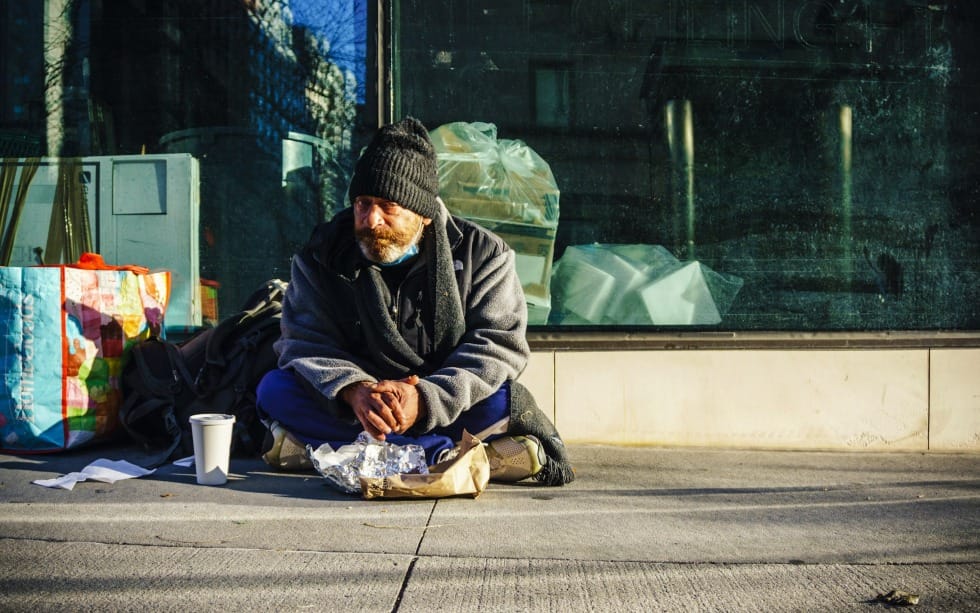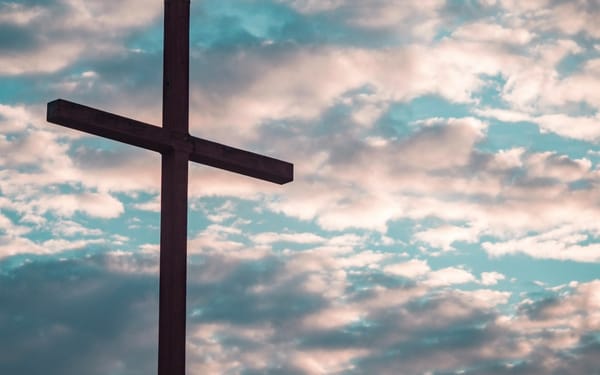How Does Gratitude Connect to Compassion?
When we live with an attitude of thankfulness for the abundant grace that God consistently pours into our lives, we must make space for others to flourish as well, knowing that we have been the recipients of abundant grace many times over.

Driving home from a chiropractor appointment one morning, I was sitting at a stoplight when a homeless man shuffled up and motioned for me to roll down my window. Having spent most of my adult life centrally located in the heart of Cincinnati, homeless people begging for their next handout was an all too common sight, and one that, quite honestly, I had become inured to. I could hardly leave my home in Mt. Auburn to head in any direction without driving past these nameless fixtures—scruffy, dirty, holding tattered cardboard signs, somehow equal parts desperate and entitled.
I typically ignored them, these stoplight encounters, either turning to talk to a child in the back seat, fixing my eyes straight ahead, or glancing down to check my phone. Rarely would I roll down my window if someone happened to catch my eye, simply smiling and shaking my head no.
But that day, I rolled down my window, and the man asked if I could spare a buck for a cup of coffee at McDonald’s, motioning to the Golden Arches located just across the street. I rarely carry cash, and while not overly streetwise, I am also not gullible enough to think that my $5, if given, would actually make its way to the cash register across the road. But something made me pause; I looked at his weathered face, the misshapen layers of clothing, surely not enough to keep the chill away, and I saw a person. Perhaps not one who had made all the right choices, but maybe someone who had not had the luxury of easy decisions, and I softened.
Telling him I didn’t have any cash, I offered to buy him breakfast at the drive-through if he’d walk over and meet me, so I took his order, picked up a bag of hot food, and handed it through my open window to eager, waiting hands. I pulled out of that McDonald’s parking lot on a chilly fall morning with a profusive “bless you, ma’am” ringing in my ears and a complex swirl of emotions to sort through on the short drive home.
Chagrin. Was this man laughing through his breakfast at being able to snag a meal from some naive lady before moving on to another target? Uncertainty. Is buying a meal the best way to help someone? Am I perpetuating their cycle of homelessness? Overwhelm. Homelessness is a multifaceted problem with both internal and external factors at play. I know how many different people I see like this on any given day, how can I possibly make a sustainable difference for any of them? Self-satisfaction. Look at me, being magnanimous and helping out the homeless today. Good deed done, check. Humility, as the Holy Spirit reminded me that he was the reason I even paused in the first place, and that it was with Spirit eyes that I was even able to see this man. Peace, remembering that it is not my job to change the world, but to love those in front of me well. Most of the time, that looks like supporting my husband, spending intentional time with my children, or texting a friend going through a rough spot, but today it looked like buying breakfast for a homeless man. And finally, lastingly, gratitude, because this brief encounter reminded me of the blessing of God on my life—the temporal benefits of food and shelter, the personal, intimate relationship with God that shapes every part of me, and the grace that enabled me to share with this man, even in this small way, the mercy and compassion of God.
The backdrop of Micah 6:8 is a landscape of social and economic injustice and idolatry, a period marked by significant disparity between the rich and the poor and by corrupt leadership. Through Micah, the Lord brings a charge against his people. He had delivered them from Egypt, protected them, blessed them, and showed his faithfulness to them, and yet they had lied and cheated, and their wealthy had become so by means of extortion and violence.
When faced with the evidence and coming consequences of their sins, the people asked, “What does the Lord require of us? Burnt offerings? Yearling calves? Thousands of rams? Ten thousand rivers of olive oil? Should we sacrifice our firstborn children to pay for our sins?” To which Micah replies,
“No, O people, the Lord has told you what is good, and this is what he requires of you: to do what is right, to love mercy, and to walk humbly with your God.”
Love for God and Neighbor
For Israel, the grateful response of worship was not insincere public ritual, but right relationship with God and people. When we are walking humbly with God, we are compelled and commanded to treat other image-bearers with dignity and compassion. Gratitude for grace is a catalyst that causes us to pursue intimacy with God and to act justly and mercifully towards others—according to both Testaments and the very words of Christ himself, love for God and neighbor are inseparable.
It's All Grace
Our own good fortune in life is never due solely to our own merit, but comes as a result of many things, such as a stable family, a solid education, friendship, community, and most importantly, the grace of God at work in our lives. John Bradford, a 16th-century English reformer and martyr, upon seeing criminals led to their execution, stated, “There, but for the grace of God, goes John Bradford.” Rather than feeling superior to or distancing ourselves from those in need, seeing others in dire circumstances should provoke humility and compassion.
Multiple times in the Gospels, Jesus was described as being “moved with compassion” when he saw image-bearers in need. In this time of year, when we celebrate Thanksgiving and are grateful for abundance, may we look beyond our circles of comfort and see the less fortunate around us with Spirit eyes.
Lord, move us with compassion and cause us to act.





